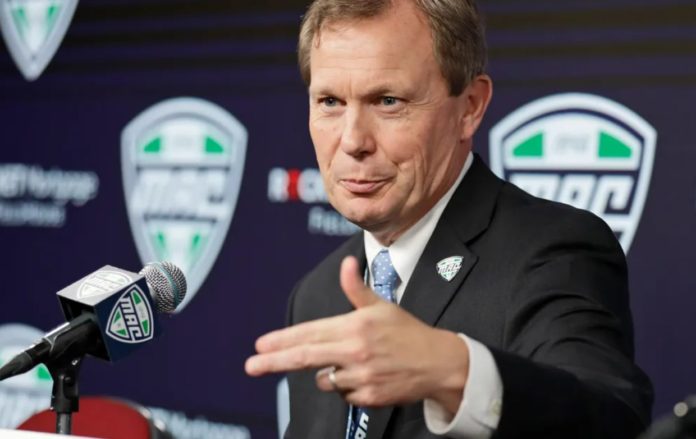“Don’t Bet On It,” says the NCAA’s tagline on posters sent to member institutions, sums up the NCAA’s stance against sports gambling by its athletes and others who work in college athletics.
For decades, the regulations have been clear, serving as the foundation for a half-million amateur athletes. However, with sports betting now legal in more than half of the states and millions pouring into once-suspicious professional sports leagues, college conferences are beginning to look for ways to profit as well.
The Mid-American Conference was the first to get in, licensing the rights to its data and statistics to Genius Sports, which will then sell them to sportsbooks.
Others are likely to follow, but the higher revenue will come with greater responsibilities. And, at a time when collegiate sports are undergoing significant upheaval, with athletes being able to profit from their celebrity and the NCAA’s viability and necessity being called into question, legalized and easily available gambling poses even more uncharted territory to navigate.
While the NCAA does not prohibit these types of economic transactions, actual sports betting is still illegal for college athletes.
“They were able to turn the other way before and say, ‘Oh, that’s all happening over here.’ But the second you’re directly getting paid from sports betting, it also comes with some responsibilities,” said Matthew Holt of U.S. Integrity, a group that works with professional sports leagues and collegiate conferences to keep an eye on gambling irregularities.
Due to a lack of openness when it comes to player availability, the expansion of endorsement deals for athletes including boosters, and the opportunity for unpaid players to practically wager on themselves with ease, Holt believes college sports is unusually primed for future scandals.
Holt claimed regulated sports betting might bring in $125 billion this year.
According to Holt, the NCAA men’s basketball tournament took in $20 million in wagers this year, and a normal college football Saturday brings in more money than a typical NFL Sunday.
While all of the major professional sports leagues have financial deals with internet sportsbooks, college conferences have lagged behind. It is hard to deny the changing reality, according to MAC Commissioner Jon Steinbrecher.
“What we’ve done, in fact, is brought sports wagering out of the dark corners and put sunshine on it and more transparency on it. And more eyes on it,” he added and “That’s a positive, that’s not a negative.”
With Genius’ aid, those nighttime MAC football games could be more appealing than ever for gamblers as early as this season.
According to Sean Conroy, Genius Sports vice president for North America, the London-based company also provides a layer of safety for its partners, including the NFL, through data analysis and contacts with sportsbooks.
Holt cautioned athletic directors and league executives in the Big Ten, Big 12, and Pac-12 conferences earlier this month in Arizona about the disparities between college and pro sports that made college more prone to corruption.
To begin with, college conferences do not force teams and coaches to report injury status or game availability. In comparison, the NFL publishes an injury report three times every week.
By withholding injury information, Holt claims, a college coach unknowingly makes those who know — from training staff to team managers to players — targets for bribery in order to gain a betting advantage.
“So I do think that the collegian space, if they’re going to open up this category for revenue and monetization, needs to take the responsibility to take a step forward in injury information and availability reporting,” Holt said.
Second, Holt believes that now that college players are allowed to make money through endorsement deals, there should be restrictions on people betting on athletes they are also paying.
“Say you have Tommy’s Used Car Shop giving the quarterback at name the university $100,000 a year and an NIL (deal),” Holt explained. “Well, the owner of Tommy’s Used Car Shop should not be able to bet on that university. It’s a conflict of interest. He has a direct influence over the player .”
According to Holt, professional leagues do a decent job of identifying influencers and placing limits on them with bookmakers.
The third, and perhaps most troubling, issue is how easy it is for sportsmen to wager on themselves. Prop bets, or wagers on individual performances in a game, are available at several online sportsbooks. Is it possible for a quarterback to throw three touchdown passes? Is it possible for the point guard to rack up six assists?
Athletes can manipulate their own numbers rather than being paid to influence the final score of a game, as has been the case with point-shaving controversies involving athletes at colleges such as Boston College, Toledo, and San Diego.
Despite the increase in NIL chances for collegiate athletes, the great majority earn small amounts of money, if any at all.
“And it’s easier for fixsters to approach those players because they don’t have to ask the player to fix a match,” Holt explained. “Hey, not only do we hope your team wins, we hope you play great. Just don’t get nine rebounds. “
Holt said that because of the work of U.S. Integrity, three states have made it illegal to bet on individual players in college sports.
“The other 30 said, ‘Thanks for the wonderful information, Matt, but DraftKings, FanDuel and Caesars, who have big lobbyists, they wanted it and they win,'” Holt added.
Image Credit: AP
You were reading: College Sports Want Money From Gambling Amid Safety Fears
